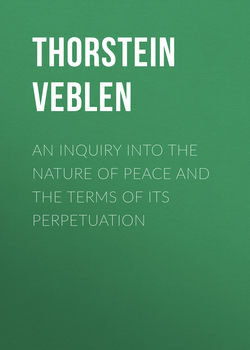An Inquiry into the Nature of Peace and the Terms of Its Perpetuation

Реклама. ООО «ЛитРес», ИНН: 7719571260.
Оглавление
Thorstein Veblen. An Inquiry into the Nature of Peace and the Terms of Its Perpetuation
PREFACE
CHAPTER I. Introductory: On the State and its Relation to War and Peace
CHAPTER II. On the Nature and Uses of Patriotism
CHAPTER III. On the Conditions of a Lasting Peace
CHAPTER IV. Peace Without Honour
CHAPTER V. Peace and Neutrality
CHAPTER VI. Elimination of the Unfit
CHAPTER VII. Peace and the Price System
Отрывок из книги
To many thoughtful men ripe in worldly wisdom it is known of a verity that war belongs indefeasibly in the Order of Nature. Contention, with manslaughter, is indispensable in human intercourse, at the same time that it conduces to the increase and diffusion of the manly virtues. So likewise, the unspoiled youth of the race, in the period of adolescence and aspiring manhood, also commonly share this gift of insight and back it with a generous commendation of all the martial qualities; and women of nubile age and no undue maturity gladly meet them half way.
On the other hand, the mothers of the people are commonly unable to see the use of it all. It seems a waste of dear-bought human life, with a large sum of nothing to show for it. So also many men of an elderly turn, prematurely or otherwise, are ready to lend their countenance to the like disparaging appraisal; it may be that the spirit of prowess in them runs at too low a tension, or they may have outlived the more vivid appreciation of the spiritual values involved. There are many, also, with a turn for exhortation, who find employment for their best faculties in attesting the well-known atrocities and futility of war.
.....
The run of the facts touching this matter of national trade policy is something as follows: At the instance of businessmen who stand to gain by it, and with the cordial support of popular sentiment, the constituted authorities sedulously further the increase of shipping and commerce under protection of the national power. At the same time they spend substance and diplomatic energy in an endeavor to extend the international market facilities open to the country's businessmen, with a view always to a preferential advantage in favor of these businessmen, also with the sentimental support of the common man and at his cost. To safeguard these commercial interests, as well as property-holdings of the nation's citizens in foreign parts, the nation maintains naval, military, consular and diplomatic establishments, at the common expense. The total gains derivable from these commercial and investment interests abroad, under favorable circumstances, will never by any chance equal the cost of the governmental apparatus installed to further and safeguard them. These gains, such as they are, go to the investors and businessmen engaged in these enterprises; while the costs incident to the adventure are borne almost wholly by the common man, who gets no gain from it all. Commonly, as in the case of a protective tariff or a preferential navigation law, the cost to the common man is altogether out of proportion to the gain which accrues to the businessmen for whose benefit he carries the burden. The only other class, besides the preferentially favored businessmen, who derive any material benefit from this arrangement is that of the office-holders who take care of this governmental traffic and draw something in the way of salaries and perquisites; and whose cost is defrayed by the common man, who remains an outsider in all but the payment of the bills. The common man is proud and glad to bear this burden for the benefit of his wealthier neighbors, and he does so with the singular conviction that in some occult manner he profits by it. All this is incredible, but it is everyday fact.
In case it should happen that these business interests of the nation's businessmen interested in trade or investments abroad are jeopardised by a disturbance of any kind in these foreign parts in which these business interests lie, then it immediately becomes the urgent concern of the national authorities to use all means at hand for maintaining the gainful traffic of these businessmen undiminished, and the common man pays the cost. Should such an untoward situation go to such sinister lengths as to involve actual loss to these business interests or otherwise give rise to a tangible grievance, it becomes an affair of the national honour; whereupon no sense of proportion as between the material gains at stake and the cost of remedy or retaliation need longer be observed, since the national honour is beyond price. The motivation in the case shifts from the ground of material interest to the spiritual ground of the moral sentiments.
.....